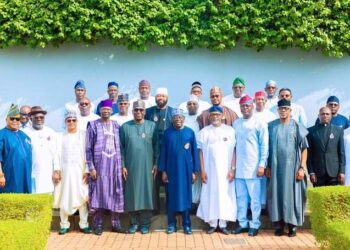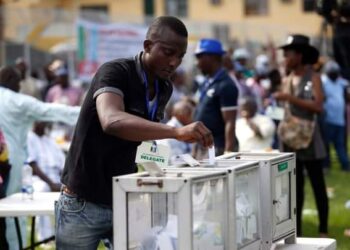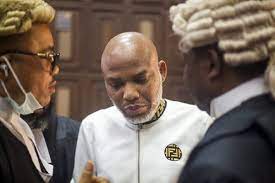Up until weekend, the National Assembly leadership crisis was lingering as there was no let go in the tussle despite recourse to party supremacy. JOHN NWOKOCHA examines the issues.
The chieftains and stakeholders of the All Progressives Congress (APC) are currently piqued by the widening cracks in the party. Particularly disturbing to stakeholders and observers is that the APC, once a formidable opposition, is the ruling party since May29 this year, cannot find a quick fix to its crises. Ostensibly in the light of this, former vice president Atiku Abubakar warned that the continued rigidity by the various camps portends a serious danger for the party. Also, the former interim national chairman, Chief Bisi Akande is furious about the colossal damage the crisis has inflicted on the party. Likewise the national chairman, Chief John Idigie-Oyegun. He expressed displeasure over the negative effect of the festering crisis and called for cessation of hostilities by the belligerent forces. But the more stakeholders interfere, the more the acrimony degenerate into full blown fight.
The utterances of the major players in the party lately portray them as not prepared for peace for now and move the party forward. Long before the crisis the Peoples Democratic Party (PDP), and keen watchers of internal wrangling in the APC soon after the party took over the reins of government foretold of implosion within the party. But not only was this predicted, the crisis has also taken multiple dimensions. If the actors in center of the crisis cannot be bothered the about 13 million Nigerians who gave their mandate to the party during the 2015 general elections have expressed either exasperation or regrets that the party is entangled in a web of controversies and acrimonies at a critical time in the life of the nation.
A political school of thought holds that the predicament of the APC over the crisis is fully presented in the views of its national publicity, Alhaji Lai Mohammed. He expressed concern on the fallout of the current entanglement within the APC, blaming it partly on the complete change of guard in terms of ruling party in the country. Hear him: “I think the concerns are genuine. It’s unfortunate that we also met ourselves in a situation we did not prepare for. We can’t be tired of repeating the fact that this particular transition is like no transition that this country has ever ever experienced. Before now, it’s either one president is succeeding the other or in the case of probably another president leaving from same political party
. This is the first time that the opposition will take over from a ruling party. And that in itself also throws up a lot of issues. Foremost of which you don’t even know what you are going to meet on ground. You
don’t know how deep the hole is. And as soon as elections were over, we were conscious of the fact that we had to hit the ground running. But at the same time, we could not push the government in power out.”
It would be recalled that the drama playing out in the APC is a semblance of what happened to the defunct Social Democratic Party (SDP) in 1993, when the ‘progressives’ won a major election in the country. Against all expectations, the various caucuses that teamed up to form the SDP could not rise above their individual narrow interests rooted in the initial political groupings that metamorphosed into the progressive movement.
IT is apparent that the leaders of APC and concerned Nigerians are totally at a loss over the continuing stalemate in the party warranting some members with good intentions and who still believe in the future and unity of the party to find a way out.
On his part, President Muhammadu Buhari at a meeting with some stakeholders of the party penultimate Friday, in Abuja urged them to swallow their pride by uniting to work towards fulfilling the pre-election promises of the APC to Nigerians. The President categorically stated that he believes in the supremacy of the party.
Though the president was not emphatic on the various tendencies that have become obvious in promoting disunity in the APC, by deductions, he was referring to the existence of caucuses, with diverse interests in the party.
In the Senate, the dust raised over the emergence of Dr Bukola Saraki as President of the senate has not settled. Currently, the APC is enmeshed in a dispute of sharing principal offices. In a popular language the offices are called Committees. And who get what has been perceived as juicy or key committees has since 1999 generated intense lobby culminating in bitter rivalries. In the 4th, 5th and up to 7th Senate and House, but most especially under President Olusegun Obasanjo (From 1999 to 2007) the Presidency (Executive) did not only interfere in assigning the committees, but also, the executive influenced the choices.
President Buhari has however distanced himself from unnecessary interference in the affairs of the national assembly. The President did declare amidst the controversy over the emergence of leadership of both chambers of the national assembly that he would work with anybody in the interest of the party. Nevertheless, APC leaders are
slugging it out with Saraki on who gets the key committees. In the House, the anti-Dogara camp as at Thursday protested the recourse to zoning principle arguing that the Speaker’s camp is ‘shifting the goal post in the middle of the match’.
In other words they accused Dogara of resorting to zoning because he finds it convenience and serves his personal interest rather than the larger interest. With the seeming fractious stance, the stalemate is far from over. The deepening crisis has in another breadth exposed the capacity of the party to manage its electoral fortunes.
Observers are quick to point out that the APC leaders in the past weeks have worked at cross purposes fueling the stalemate to the excitement of the PDP going by the statements made by the party particularly in recent time. What is difficult in respecting party supremacy? Observers could curiously ask. Indeed party supremacy is an important side to the ongoing feud. Quite often,
decisions by political parties are said to be supreme and taken in the overall interest of the members. Understandably, decisions of this nature are made by a small group of individuals called Caucaus. Their decisions are contested sometimes because of what aggrieved members term vested interested. It is apparent that this is what is playing out in the APC.
Looking back, there was the PSP caucus, Yar’Adua camp (Peoples Front), Northern and Southern cleavages, ethno-religious appendages, among others. The problem was compounded by the degeneration of the intra-party dispute to the conservatives versus the real progressives among the political class.
Nearly two years after it was formed, the remnants of the major parties that coalesced into the APC are pronounced. These tendencies are holding the party by the jugular over the sharing of positions raising fears that their activities could seriously rub on governance. Each of these causes exists under the shadow of influential party buffs. Rather than diminishing, the caucuses have multiplied in number with most of them springing up to throw jabs at perceived enemies of their principal.
The most pronounced caucuses comprise the CPC, ACN; ANPP, new PDP and the APGA splinter group, which represent all the key political parties that merged to form the APC. Other tendencies that are involved in the power struggle in the party include the Northern caucus, South-West caucus; Unity Forum, Like Minds Senators, as well as caucuses bearing different appellations claiming to be professing and protecting the interest of APC elements from the North-Central, South-East and the South-South zones. The existence of these blocs with seemingly disparate objectives is seen by many as denying the APC a major caucus as the party with the majority of members in the Senate and the House.
Take power and influence for instance, the formidable caucus in APC is that of governors and former governors. Because of their number and resources at their disposal the caucuses of the two groups tend to march the political sagacity of those APC leaders considered as welding awesome power and influence over other party faithful. Most of the other elected party members, especially in the legislative arm of government at various levels bow to the dictates of either former governors or incumbent governors considered as the overlords.
Of course, this is by no means diminishing the powerful whims of national leaders of the party. Most prominent of whom is Asiwaju Bola Tinubu. Besides controlling the party the overlords are bent on taking the booties as it were, causing contending interests to clash. From hindsight, Akande listed the power blocs or caucuses perceived to have contributed to the crisis in the APC. The pertinent question is what then is the use of party supremacy? Another rational question is who really is making the decisions?



